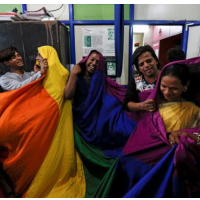India's Supreme Court will Review Law Criminalizing Gay Sex
 Gay rights activists celebrate Supreme Court announcement (photo: Danish Siddiqui, Reuters)
Gay rights activists celebrate Supreme Court announcement (photo: Danish Siddiqui, Reuters)
By Aditya Kalra and Andrew MacAskill
NEW DELHI (Reuters) - India's top court on Tuesday said it will review a decision over whether to uphold a colonial-era law that criminalizes gay sex in a victory for homosexual rights campaigners at a time when the nation is navigating a path between tradition and modernity.
The Supreme Court asked a five-judge bench to examine whether the 1860 law, which imposes a 10-year sentence for gay sex, is constitutional, a lawyer for a gay rights group said.
"It is definitely a move forward," said lawyer Anand Grover as activists gathered outside the court cheered.
This was the last legal avenue for campaigners seeking to use the courts to strike down the law. Otherwise, any future decisions to lift the ban will rest with the country's politicians who are largely conservative and oppose any changes.
The Supreme Court made a surprise ruling in 2013 that reinstated a ban on gay sex. That decision ended a four-year period of decriminalization that helped bring homosexuality into the open. After the hearing a group of gay rights activists outside the court sang: "We will be successful." Human rights group Amnesty International India welcomed the court's review, saying the law puts homosexuals under physical, mental and legal threat. "The Supreme Court has another chance to correct a grave error," Amnesty said. National surveys show about three-quarters of Indians disapprove of homosexuality and are deeply traditional about other issues of sexuality such as sex outside of marriage.
India is one of 75 countries around the world that outlaws homosexuality, according to the International Lesbian, Gay, Bisexual, Trans and Intersex Association.
Although the law banning homosexuality is rarely enforced in India, it is used to intimidate, harass, blackmail and extort money from homosexuals, activists say.
There are no official figures on the number of cases and most go unreported as victims are too scared to report crimes to the police, fearing they will be punished too, activists say.
While the previous Congress-led government had pledged to repeal the law if it came to power again, it was crushed by Prime Minister Narendra Modi's Bharatiya Janata Party in general elections in May 2014.
In December, members of Modi's party, which has an overwhelming majority in the lower house of parliament, scuppered a private member's bill to scrap the law.
"It is about principles of freedom enshrined in our constitution," Shashi Tharoor, the opposition Congress lawmaker who introduced the bill, told Reuters.
"It's time to take the government out of the bedroom."
To Learn More:
Section 377: Swamy Calls Homosexuality a “Genetic Disorder” (by Karan Singh, AllGov India)
Homosexuality Still Illegal in 77 Countries (by Noel Brinkerhoff, AllGov)
Indian Election Commission Allows Eunuchs to List Gender as “Other” (by Noel Brinkerhoff, AllGov)
- Top Stories
- Controversies
- Where is the Money Going?
- India and the World
- Appointments and Resignations
- Unusual News
- Latest News
- India College Chain’s Expansion into U.S. Draws Opposition from Massachusetts Officials over Quality of Education
- Milk Shortages in India Tied to Release of New Movies Featuring Nation’s Favorite Stars
- Confusion Swirls around Kashmir Newspaper Ban in Wake of Violent Street Protests
- Polio-Free for 5 Years, India Launches Vaccine Drive after Polio Strain Discovery
- New Aviation Policy Could Increase Service, Lower Ticket Prices






Comments